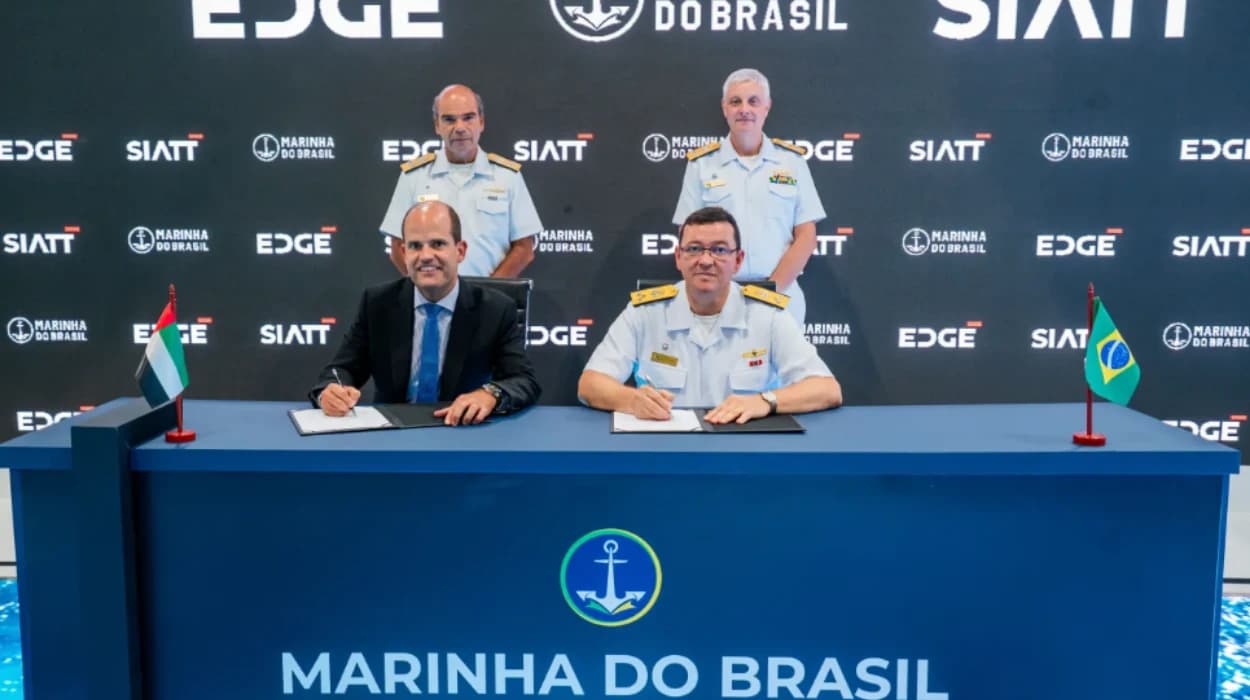EDGE Group, the Emirati state-owned defence conglomerate,
has expanded its operations in Brazil and Switzerland, opening new production
and R&D facilities that raise questions on foreign military investments.
The expansion includes significant acquisitions and contracts, prompting
scrutiny from various quarters regarding international defence partnerships,
technological sovereignty, and strategic implications.
EDGE Group’s Expanded Footprint in Brazil and Switzerland
As reported by Agnes Helou of Breaking Defense, EDGE Group
has announced the establishment of a new 6,000 square metre headquarters and
production facility for its subsidiary SIATT in São José dos Campos, Brazil.
This new facility is set to boost research and development as well as
production line capacity. Hamad Al Marar, CEO of EDGE Group, noted in the
statement:
“This was our first investment in Brazil, back in 2023, and since
then we have expanded significantly from a research and development plant to an
impressive industrial plant. This reflects SIATT’s commitment to advancing
Brazil’s technological autonomy and creating long-term value for its defence
industry”.
Simultaneously, EDGE’s subsidiary ANAVIA, based in
Switzerland, inaugurated new headquarters and an unmanned aerial systems
prototyping facility in Bilten. ANAVIA’s CEO Jon Andri Jong highlighted the
centre as a dual-hub engineering and production innovation site to accelerate
the development of next-generation unmanned helicopters, empowering both UAE
and European defence capabilities.
Strategic Acquisitions and Collaborations
EDGE Group, since its inception in 2019, has shown rapid
growth, marked by acquiring a controlling stake in SIATT (Brazil) and ANAVIA
(Switzerland) in 2023. Multiple contracts have fortified its position globally,
including a $300 million deal with the UAE Armed Forces for MANSUP missile
systems and contracts with Brazilian authorities.
At LAAD 2025, EDGE acquired intellectual property for the
MANSUP-ER missile (an extended-range anti-ship missile), developed by Brazil’s
SIATT, which is expected to integrate into Brazilian naval vessels by late
2025. Rodrigo Torres, EDGE Group’s Chief Financial Officer, stated,
“Partnering
with the Brazilian Navy and leveraging cutting-edge technologies such as
MANSUP-ER, we can redefine strategic and operational readiness”.
Additionally, EDGE and the Brazilian Navy signed a letter of
intent for co-developing anti-drone systems aimed at enhancing naval security,
utilising radar, electro-optical sensors, and jamming technologies to combat
emerging autonomous aerial and surface threats.
EDGE Group’s Global Expansion and its Implications
According to a comprehensive feature by Defence & Security,
EDGE Group’s growth has been exponential—its product portfolio surged by over
550% in five years, and it now serves customers in 91 countries with annual
revenues nearing $5 billion. The group’s increasing international footprint
comes with multiple acquisitions: apart from SIATT and ANAVIA, investments
include Milrem Robotics (Estonia) and Condor (Brazil), the latter specialising
in non-lethal technologies.
The expansion to Brazil and Switzerland signals an increased
willingness by the UAE to embed itself in critical defence industries
worldwide. H.E Faisal Al Bannai, EDGE Group Chairman, highlighted the strategy
as “a national vanguard of future technologies,” focusing on autonomous
systems, electronic warfare, and precision-guided munitions, all aimed at
strengthening both local and global defence readiness.
This fast-growing cross-border expansion, however, invites
scrutiny about foreign military technology transfer, sovereignty concerns, and
the geopolitical influence of non-traditional defence powers such as the UAE.
Scrutiny Over Foreign Military Investments
Multiple defence analysts and media commentators emphasise
that EDGE's significant foreign acquisitions and facility openings in strategic
countries such as Brazil and Switzerland warrant close examination. Concerns
revolve around technology transfer risks and the broader strategic alliances
being shaped by these ventures. A closer relationship with the Brazilian Navy
underlines the UAE's ambitions in Latin America’s defence landscape, which some
observers argue could disrupt existing regional balances.
In Switzerland, the presence of ANAVIA’s advanced unmanned
systems R&D facility signals deeper engagement in Europe’s high-tech
defence sector. This intensifies scrutiny about the role of non-European
military contractors in regional defence innovation chains, particularly given
Switzerland’s traditionally cautious stance on foreign military involvement.
EDGE Group
Leadership Outlook
In an interview featured during IDEX 2025, EDGE CEO Hamad Al
Marar discussed the group's sustained revenue levels and expanding order book
surpassing $5 billion, with 14,000 employees worldwide and a focus on
innovation across multiple domains including AI and autonomous systems. He
elaborated:
“We have the capability, and we complement it with the rest of the
country,”
signalling the UAE's holistic approach to integrating national AI and
data infrastructure with defence advancement.
Al Marar also pointed to acquisitions aimed at filling portfolio
gaps, such as bringing Condor’s manufacturing both to Brazil and the UAE to
serve global markets, illustrating EDGE’s dual-local and global strategy.
EDGE Group’s
aggressive expansion in Brazil and Switzerland, marked by new facilities,
acquisitions, and strategic contracts, effectively establishes the UAE as a
global player in the defence sector. While the group champions technological
advancement and cooperation with host nations’ militaries, these moves
inevitably invite scrutiny regarding foreign military investments and
geopolitical implications, particularly concerning sovereignty, technology
control, and regional power shifts. As EDGE continues to scale operations and
innovate, governments and international stakeholders will need to balance
potential benefits against strategic risks inherent in such transnational
defence partnerships.

